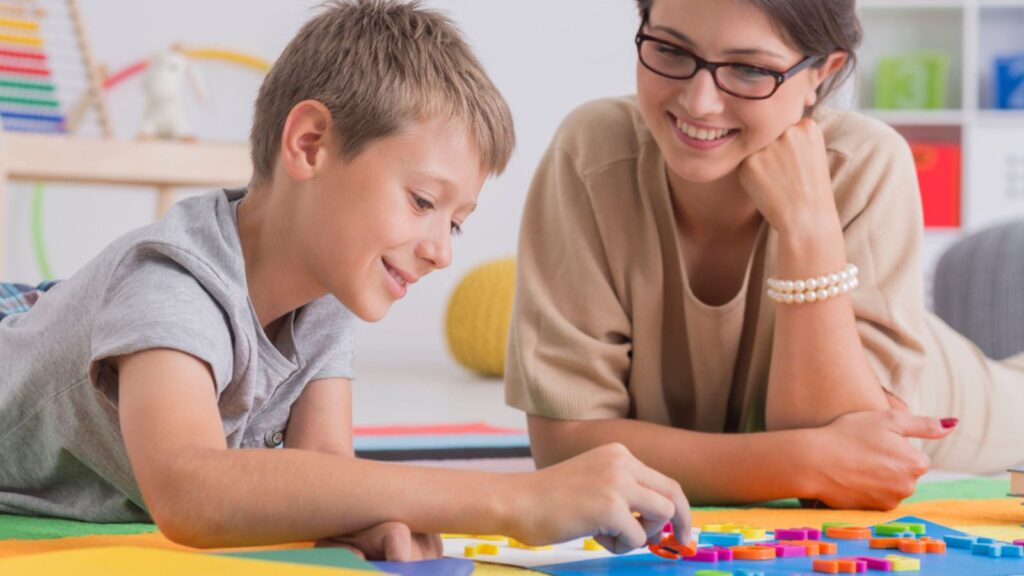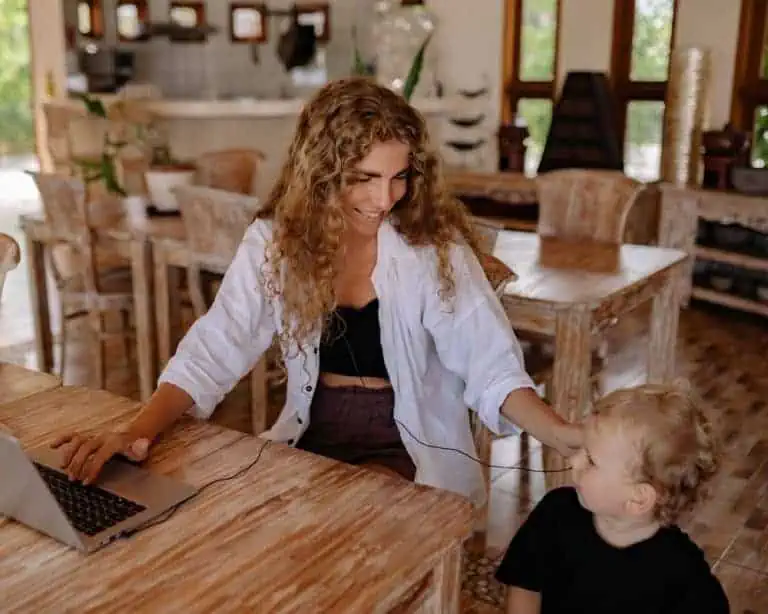15 Ways to Raise Emotionally Intelligent Kids
This post may contain affiliate links. As an Amazon Associate, I earn from qualifying purchases.
Children and emotional intelligence feel like a paradox sometimes–most children struggle with regulating their emotions and being reasonable (which is totally normal, by the way). Raising emotionally intelligent children is a journey that requires patience, understanding, and a lot of love.
Positive Psychology says emotional intelligence is about raising kids who can express themselves, listen to others, and self-regulate. They recognize and manage their emotions and understand the emotions of others. Does that mean they’re going to be perfect all the time? Of course not (neither are adults).
Can you teach a little human who barely understands himself how to be emotionally intelligent? Absolutely! It’ll be harder for some kids than others, but emotional intelligence is essential for healthy relationships, effective communication, and overall well-being. Here are some practical tips to help you nurture your child’s emotional intelligence.
1. Stay Calm When They’re Having Big Emotions

Maybe the first lesson in teaching emotional intelligence is developing it yourself. Children often struggle to manage their big emotions, and it can be challenging for parents to remain calm in such situations. However, staying composed is crucial. When you stay calm, you model emotional regulation, showing your child how to handle intense feelings.
Take deep breaths, speak softly, and offer comfort. Your calm presence can help de-escalate the situation, making it easier for your child to regain control over their emotions. Remember, your behavior sets the tone for how they will learn to handle their own emotional outbursts.
2. Seek to Understand, Not to Judge

It’s true; you were 7 years old several decades ago, so it’s possible to think you already know what your child is feeling before a word is on their lips. However, when your child is expressing their feelings, it’s important to listen with the intent to understand rather than judge. Avoid jumping to conclusions or dismissing their emotions. Instead, focus on empathizing with their experience.
Ask open-ended questions to encourage them to share more about what they’re feeling. This approach not only validates their emotions but also helps them develop a better understanding of their own emotional landscape. It fosters a sense of trust and openness between you and your child.
3. Validate Their Feelings

CNBC recommends validating your child’s feelings, which means acknowledging their emotions without judgment. It’s a powerful way to show them that their feelings matter and that feeling a range of emotions is okay.
Use phrases like, “I see that you’re upset” or “It sounds like you’re feeling frustrated.” This helps your child feel seen and heard, which is essential for their emotional development. Validation builds a foundation of empathy and understanding that will benefit them throughout their lives.
4. Ask Them Questions

Engage your child in conversations about their feelings by asking thoughtful questions. This encourages them to reflect on their emotions and articulate what they’re experiencing.
A question like, “What made you feel that way?” prompts them to think critically about their emotions and possible solutions. This practice enhances their emotional vocabulary and problem-solving skills.
5. Set an Example for Them

Children learn more by observing the adults around them than by being told what to do. Set an example of emotional intelligence by managing your own emotions effectively. Show them how to navigate challenges with grace and composure.
Don’t be a perfectly programmed robot–discuss your own feelings openly and demonstrate healthy coping mechanisms. They are likelier to adopt similar behaviors when they see you handling stress, disappointment, and joy constructively (or admitting when you could’ve handled a situation better).
6. Happy Parents, Happy Children

Children can feel your vibe, and your emotional well-being significantly impacts your child’s emotional state. Strive to maintain a positive outlook and prioritize self-care. Your child benefits from a nurturing and supportive environment when you’re happy and balanced.
Create joyful moments with your child, engage in activities that bring you happiness, and maintain a harmonious home atmosphere. Your happiness sets the stage for your child’s emotional well-being.
7. Apologize When You Make a Mistake

Many Gen-X and Millenials grew up in an era when parents didn’t apologize to children. Admitting when you’re wrong and apologizing to your child teaches them humility and accountability. It shows them that everyone makes mistakes and that taking responsibility is a sign of strength.
When you apologize, explain what happened and why you’re sorry. This sets a powerful example of owning up to mistakes and fosters a culture of honesty and forgiveness within your family.
8. Seek Solutions Together

Don’t always rush to little Tommy’s side to help him when he’s stuck with making a decision. Involve your child in problem-solving processes. When they face challenges or conflicts, work together to find solutions. This collaborative approach empowers them to take an active role in resolving issues.
Encourage brainstorming and discuss the pros and cons of different solutions. This will enhance their problem-solving skills and teach them the value of teamwork and cooperation.
9. Let Them Learn from Their Mistakes

The default setting for most parents is to keep their children from making mistakes, especially mistakes they made when they themselves were children. Allowing your child to make mistakes and learn from them is crucial for their emotional growth. Resist the urge to shield them from every failure. Instead, provide guidance and support as they navigate the consequences of their actions.
Discuss what went wrong and what they can do differently next time. This helps them develop resilience and a growth mindset, understanding that mistakes are opportunities for learning.
10. Don’t Be Easily Manipulated

They may be little, but they’re born with a natural talent for wrapping you around their pinky finger. Children may sometimes test boundaries to see how far they can go. It’s important to remain firm and consistent in your expectations and consequences.
Set clear boundaries and stick to them. This consistency helps your child feel secure and understand the importance of rules and limits. Being easily manipulated can undermine your authority and create confusion.
11. Give Them Age-Appropriate Tasks

A child who feels incompetent will be frustrated, especially if their peers can do things they can’t. They may not know how to express this frustration, and little tantrums such as throwing their books or crayons away in protest may be witnessed.
Assigning age-appropriate tasks and responsibilities fosters independence and self-confidence. It teaches them valuable life skills and helps them feel capable. Praise their efforts and provide constructive feedback.
12. Don’t Be Too Eager to Be Liked by Your Kids

We like to think of our own children as our “little best friends,” but children seeing you as a friend only and not an authority can be confusing. Encourage honesty by creating an environment where your child feels more comfortable telling you the truth rather than what they think you want to hear.
Your child may not always like your decisions–that’s okay. Don’t let it discourage you from setting boundaries and enforcing consequences. This will avoid scenarios where children storm out of rooms and bang doors when asked to account for their actions. Reinforce that trust is built on truthfulness.
13. Be Generous with Love

Show your child unconditional love and affection. This provides a secure foundation for their emotional development and helps them feel valued and supported. Express your love through words, actions, and quality time spent together.
A loving environment fosters emotional security. A child who’s told, “I love you,” often is able to love others too and recognize when they’re hurting.
14. Encourage Creative Expression

Encourage your child to express themselves creatively through art, music, writing, or play. Creative activities provide an outlet for feelings they might not have the words to express. It allows them to explore their inner world and can be a powerful tool for emotional release and understanding.
Supporting their creative endeavors without judgment shows that you value their individuality and encourages them to explore their thoughts and feelings healthily and productively.
15. Name Emotions

Teach your child to identify and name their emotions accurately. Understanding and verbalizing feelings like sadness, frustration, joy, or anger is crucial for emotional awareness.
Understanding their emotions early can help children manage their feelings better and develop empathy for others. From a young age, help them build an emotional vocabulary by naming your own emotions and encouraging them to do the same.
20 Strong Words Parents Should Never Say to Their Kids

Countless adults sitting in a therapist’s office today are grappling with the lasting impact of words spoken by their parents during childhood. Regardless of how you perceive yourself, in your child’s eyes, you are nothing short of the most remarkable thing to happen to them since “skip intro.” This underscores the critical importance of being mindful of what you say to your children, as your words become the small but influential voice in their developing minds.
20 Strong Words Parents Should Never Say to Their Kids
16 Common Phrases Grandparents Should Stop Saying to Their Grandkids

Do you still remember something your grandparents said that made you uncomfortable? As much as we adore our grandparents, their words (even with good intentions) can sometimes hurt our feelings or are plain embarrassing.
If you are a grandparent, using your words mindfully around your grandkids is as crucial as any other relationship. Words hold immense power and shape our kids’ behaviors and perceptions.
16 Common Phrases Grandparents Should Stop Saying to Their Grandkids







